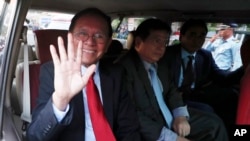The first day of Kem Sokha’s trial hearing ended Wednesday evening, with the former opposition leader facing questions about his early political career, the founding of a human rights group and its funding by international donors, especially USAID.
The long-awaited trial commenced Wednesday morning, more than two years after Kem Sokha was arrested for alleged treason. The opposition leader attended both sessions of the hearing and will return to court on Thursday, rounding up this week’s hearings. The trial is expected to take three months, with two hearings every week.
After the morning session focused on a video clip that, according to the government, supports the treason charge, the presiding judges considered a proposal from government lawyers to use Khmer letters as monikers to refer to foreign governments, organizations, and individuals during the trial, to ensure that Cambodia does not damage its foreign and diplomatic relations.
These monikers, the government lawyers said, would apply to countries linked to the case, such as the U.S., Canada, the EU, Indonesia, India, Yugoslavia, Serbia, Australia, and Taiwan.
International organizations and groups that would also receive these labels are USAID, National Democratic Institute, International Republican Institute, American Center for International Labor Solidarity, Peace Corps, Dan Church Aid, and Konrad-Adenauer-Stiftung, among others.
Individuals that would get a moniker included U.S. President Donald Trump and Australian journalist James Ricketson, who was found guilty of espionage in August 2018.
The presiding judges ruled that the theses names would be used during the hearing and will be entered in the trial records, which is a confidential document, but the monikers will be used for the verdict which is a public document.
“They first decided to agree with our proposal to use the coding with [Khmer] letters in both trial record and verdict,” said government lawyer Ky Tech. “But after [further deliberation], the judges decided to accept only one of our proposals permitting the use of the code in the verdict.
The presiding judges, prosecution and government lawyers then proceeded to question Kem Sokha about his activities as a politician and human rights activist. The court decided to divide the questioning into two timelines, the first round of questions from 1993 to 2007, and the second will cover his activities until he was arrested in 2017.
Meng Sopheary, Kem Sokha’s lawyer, said the opposition leader was asked his early political career in parliament and his decision to start the Cambodian Center for Human Rights (CCHR), which he headed from 2002 to 2007.
“He said he set up CCHR and got funding from USAID,” she said. “This is normal in Cambodia because [many] NGOs get foreign funding.”
She added that receiving funding from foreign donors was legal and that there was nothing to show that any of the CCHR funding was from nefarious means.
“They did not get funds from rebels or any illegal organizations,” she said.
The trial will resume on Thursday when the defense is expected to continue questioning Sokha about his activities from 1993 to 2007, after which the court will look into his work till 2017.
For detailed coverage of the morning session of Day 1, click here.







